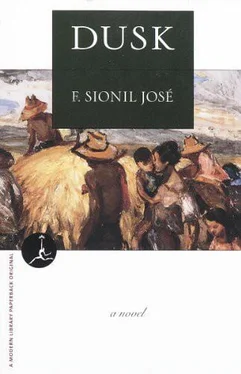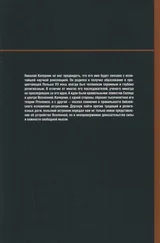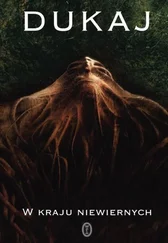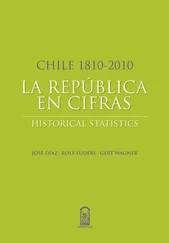“You are alive,” Dalin murmured in his car.
He lifted the coarse Ilokano blanket and saw the big bones that were his knees. His thighs, his legs — they were withered, too. Shocked, frightened, how did all this happen? It was only last night that he had gone to sleep.
Dalin had hurried to the kitchen and returned with a bowl which she set on the floor. Then, propping his head against the buri wall, she fed him a spoonful. The soft-boiled rice was spiced with strips of onion but the aroma escaped him and so did its taste. It scalded his mouth and tongue. The gritty gruel sank quickly and brought a warm glow all over his middle. It brought, too, a new kind of throbbing to his head, and he was conscious now of the nearness, the soft nudging of Dalin’s breast against his shoulder. His hand had become sweaty and, trembling, he sought the cool, smooth touch of the bamboo floor and the breeze that came up through the house from beneath it.
“Eat now,” Dalin said, dipping the spoon again into the bowl. “It has been a month — a month that you were very ill, that you knew nothing.”
“A month? It cannot be — just seven days, just seven days …” He sighed, then with eyes closed so that he would not see the house suddenly turning over, he sank back onto the floor.
“My husband,” Dalin said huskily. “You have to live — not for me, but for the child I am carrying …”
This was the moment of revelation, and he would have wanted to see her in her full splendor, drink her very essence, wallow in her tenderness, but he did not dare open his eyes for fear that he would be suspended in midair, that she would not be within the frame of his vision but would be mist, as even now, with his eyes closed, he was sinking into a vast hollow, the world was whirling, and he could not stop it.
Think, remember how it was, the very beginning when the fever suffused you. Is there ever a beginning with no end? We have always been here and shall pass as all others have, leaving nothing behind.
The dizziness ebbed, he dozed off into a limbo, and when he woke, it was already light — not dark as he remembered; the sun splashed on the buri wall. He tried to rise but could not. His head had become a leaden ball. He lay still, all sense of direction dulled, and the small house itself seemed to be falling into an abyss.
It was Dalin again who stopped the fall; she came in and by her very presence steadied him. She placed a bamboo chair before the window, then returned to him, went down on her knees — so close that he could smell the sun on her skin, the honey in her breath.
“You can sit there,” she said.
He tried to rise but to his amazement there was no strength in either his arms or legs. “I am not strong,” he said. She bent still closer to him and held him in the crook of his legs and shoulders so that he snuggled to her, and as a mother would take a baby from the crib, she lifted him and gently propped him on the chair.
He saw what the new world was — the sun a white flood upon the plain, so green and shiny he could feel the earth throb. In the sky, clouds billowed in masses of kapok white. This was creation itself and Istak began to cry.
It came back — the dim voices in the night, his brother An-no shouting in the yard, the scuffle there, the curses, and Dalin, her face taut with despair.
“What happened to An-no?”
His words were clear but she merely looked at him and did not speak.
“Tell me,” he insisted, turning away from the window and the new life framed there.
“They took him away,” she said sadly. “He claimed as his what your father did. They wanted to get you but he said it was he. You were very ill. We understood.”
“That his life was not worth as much as mine?”
She looked at him and did not reply.
“They showed us his body — they wanted us to know. Then they gave it to us. He had a good funeral.”
For a long time he did not speak; head bowed, he closed his eyes and brought to mind how it was, the journey that brought them to this land and to the beginning which was Po-on. Again, those days when An-no, Bit-tik, and he were small, roaming the green fields in May, searching for the first growths of saluyot that their mother cooked with grasshoppers which they had caught to eat as well, three brothers swimming in the river, gathering the fruits of camantres and lomboy that grew wild there. What did these years engender? He had been away from them for ten years and yet, though there were enmities among them, the bond had endured — reaffirmed by a supreme act of love. Why did An-no do it when he could just have remained silent and they would have taken him instead? Why did he do it and in doing so gamble as well? Istak was ill and dying — how could An-no have known that he would survive the fever? He turned all these questions over, remembering only what was good to remember of a past that he wanted to forget. Did he not even have a new name? He started to cry again, the tears scalding his eyes, trickling down his cheeks, and he shuddered, his thin frame shaking with the immensity of his grief.
Dalin embraced him.
One evening, when Istak was already well and could stand and walk around the house but not venture into the yard as yet, Bit-tik and Orang came with a big bowl of wild-pig meat stewed in vinegar. Bit-tik had trapped the animal that had been destroying the peanut patch at one end of his farm.
Istak could eat his fill and would soon be strong enough to work in the bangcag , and teach and heal again. They ate in the kitchen, savoring the meat, Orang hardly speaking. Sadness still lingered in her face, but neither grief nor motherhood had destroyed her handsome features.
“I want to ask you a question, Manong,” Bit-tik said when they were finished. Dusk was descending quickly, and in a while, Dalin would light the earthen oil lamp that dangled from a rafter, then join them squatting around the low table.
“When was it that you could not ask me anything?” Istak asked.
He could see Orang nudge Bit-tik on the side, and Bit-tik looked at her briefly, then spoke again: “It has been three months now that Manong An-no has gone. I live in his house.”
“It is also your house,” Orang said softly.
Bit-tik glanced at her, then went on. “The year of mourning is not over. Is it a sin, Manong? In my heart, I know it is not.”
Istak knew at once what his brother would say next; he did not let him. “Orang needs someone to look after the farm An-no left behind. And her two very young children — they hardly knew their father. You will now be father to them. And you can truly love them, for your blood is also in them. And now, you have two farms to work, not just one. But when will you stop wandering, and be tied to a house? Orang keeps a good house, and she knows how to cook very well — look at this adobo . Where can you get something as good as this except in a rich man’s house?”
Dalin sat beside Orang; she was older by at least five years and since that time when Capitán Gualberto had ravaged her, there had existed between the two a bond stronger than that which welds two sisters together.
“I am very happy it will be this way, Orang,” Dalin said.
The rains came and in early July a typhoon blew across the land and bowled over many farmers’ homes. But not the houses of Istak and An-no. With the typhoon came the nine-day rain which flooded the fields and swelled the rivers to overflowing, and with the land washed fresh, the pestilence disappeared. As Dalin’s belly grew, Istak regained strength. He had not brought any books from Cabugaw and had yearned so much for something to read, particularly in those times when, weak and emaciated, he could not leave the house. He tried recalling the important though tiny bits of knowledge taught him, and formulated a chronology wherein he could recall events, people, fragments of the past that must be resuscitated so that the present could yield some meaning or, at least, be explained.
Читать дальше












